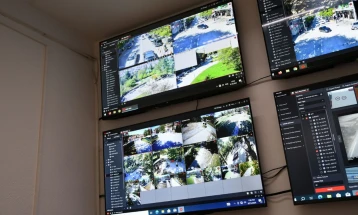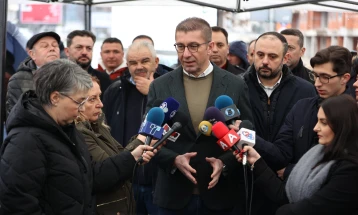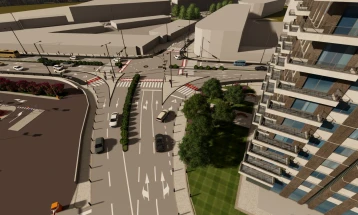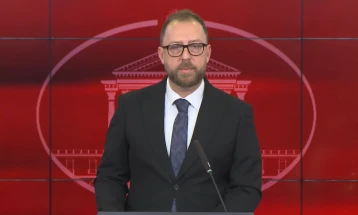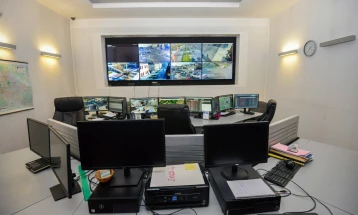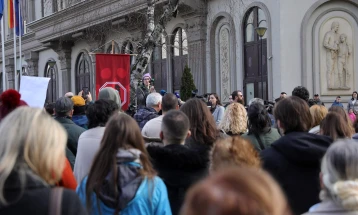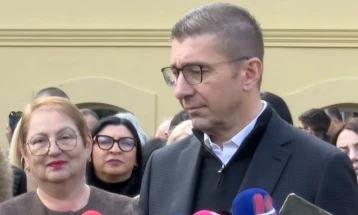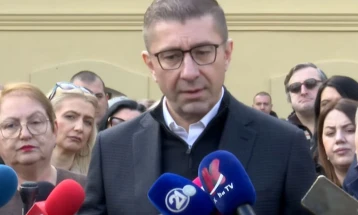Blazhe Koneski’s Nebregovo living proudly and peacefully
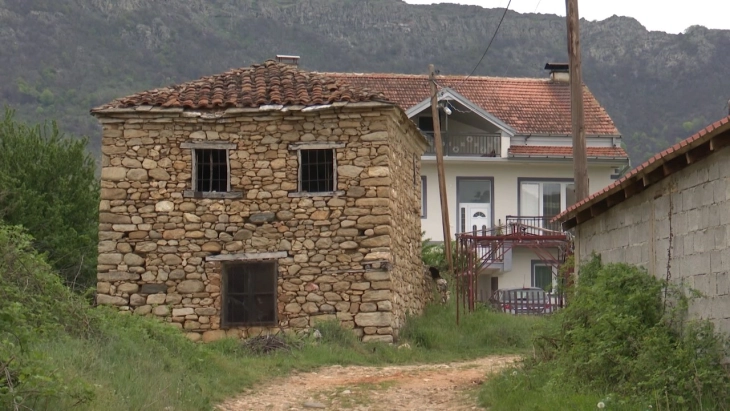
Prilep, 26 July 2021 (MIA) - Hidden in the base of Babuna Mountain, in the Prilep Field, is Blazhe Koneski’s birth village of Nebregovo. Up above at 700 meters of altitude, it borders the villages Prisad, about 17 kilometers away, Dabnica to the east, Gorno Selo to the south, Dupjachani to the west and Drenovci and Omorani to the north. If you head out from Prilep, you need to traverse 20 kilometers.
Nebregovo is a village with a Macedonian population, and sixty years ago it became part of Dolneni Municipality. 552 people lived there at the start of the 20th century, only for that number to go down to 156 in the 21st century.
We went there for a visit during the heat of the summer. It’s calm and peaceful. The people there are either in the field or the nearby marble mine. Life goes by peacefully, without much excitement. Even though it’s near Prilep, a city where contacting people is dangerous during the pandemic, the peace remains in these hard, challenging times.
We looked for the residents in the village, and noticed people working in the center of the village – the former school building. The workers, employed by the Prilep Institute and Museum, are reconstructing the small school building where our very own Blazhe Koneski went to the first grade. Except for workers, we hope to find anyone in this summer afternoon to tell us about everyday life in Nebregovo through a nostalgic lens.
 We met 48-year-old Orde Pavleski in front of his house in the center of Nebregovo. He lives with his wife, his 21-year-old son and 19-year-old daughter in Nebregovo. His son works in Prilep, his daughter is married, and he lives in the village. Nebregovo, he says, is immediately recognized because of Blazhe Koneski.
“How’s life going? Well, we primarily work on tobacco, some work in the marble mine above the village. What keeps us here? The nature is clean, there is no pollution, and we make a lot of money from making tobacco and marble. We have all sorts of communications: water, phones, asphalted roads. It’s a nice life, would’ve been nicer if tobacco sold for more. Blazhe Koneski means a lot to us. Wherever we go, our village is recognized because of him. I’ve gone all over Macedonia, and no matter where I go, everyone knows where I’m from when I mention Nebregovo and Blazhe Koneski. And everyone just immediately knows. Anyway, the village has the potential to develop. It has the conditions. We have been hearing the stories about Blazhe Koneski for decades and we can tell them to other people. We’re proud,” Orde Pavleski says, pointing to the school building where Blazhe Koneski studying.
Our stroll took us to 70-year-old Petre Markoski, born in Nebregovo like the generations before him. He met Blazhe Koneski as a young man, when Blazhe first came to the village. The village is peaceful, the residents don’t leave or move away. Blazhe Koneski was the reason why the village got so many conveniences. However, his image and work are not respected enough.
“It’s a peaceful life. We got the road and the plumbing system because of Blazhe Koneski. But, we should respect him more. Everyone broke off to their own political party, but no one should be divided about Blazhe because of everything he did for us, for the Macedonian language and literacy. We know he created the Macedonian language and he gave so much for us. I remember seeing him for the first time in 1979 when he came here with Blagoja Taleski, after the road was made available to use. He left a wonderful impression. A calm, spiritual, educated man – one of our own. I was young then, I was 28. That was the first and last time I saw him. I know he went to the country school, and that it was called Petre Pavleski at the time, and it’s now being renovated. Youth would gather there for dances back in the day. More should be done for Blazhe. There are always visitors going to his house, but there should be more,” 70-year-old Nebregovo resident Petre Markoski says.
He adds that they didn’t have too many issues with the coronavirus. Who knows why, he says, maybe it’s the air, maybe it’s the nature, but they’re not complaining. Life in Nebregovo isn’t bad.
“It’s not bad. We have a road, a water supply, phone and internet connections. We simply do not have a problem. You can get to Nebregovo from Prilep in 20 minutes. If anyone wants to live here, it’s peaceful and calm, and we have no problems,” 70-year-old Petre Markoski says.
We met 48-year-old Orde Pavleski in front of his house in the center of Nebregovo. He lives with his wife, his 21-year-old son and 19-year-old daughter in Nebregovo. His son works in Prilep, his daughter is married, and he lives in the village. Nebregovo, he says, is immediately recognized because of Blazhe Koneski.
“How’s life going? Well, we primarily work on tobacco, some work in the marble mine above the village. What keeps us here? The nature is clean, there is no pollution, and we make a lot of money from making tobacco and marble. We have all sorts of communications: water, phones, asphalted roads. It’s a nice life, would’ve been nicer if tobacco sold for more. Blazhe Koneski means a lot to us. Wherever we go, our village is recognized because of him. I’ve gone all over Macedonia, and no matter where I go, everyone knows where I’m from when I mention Nebregovo and Blazhe Koneski. And everyone just immediately knows. Anyway, the village has the potential to develop. It has the conditions. We have been hearing the stories about Blazhe Koneski for decades and we can tell them to other people. We’re proud,” Orde Pavleski says, pointing to the school building where Blazhe Koneski studying.
Our stroll took us to 70-year-old Petre Markoski, born in Nebregovo like the generations before him. He met Blazhe Koneski as a young man, when Blazhe first came to the village. The village is peaceful, the residents don’t leave or move away. Blazhe Koneski was the reason why the village got so many conveniences. However, his image and work are not respected enough.
“It’s a peaceful life. We got the road and the plumbing system because of Blazhe Koneski. But, we should respect him more. Everyone broke off to their own political party, but no one should be divided about Blazhe because of everything he did for us, for the Macedonian language and literacy. We know he created the Macedonian language and he gave so much for us. I remember seeing him for the first time in 1979 when he came here with Blagoja Taleski, after the road was made available to use. He left a wonderful impression. A calm, spiritual, educated man – one of our own. I was young then, I was 28. That was the first and last time I saw him. I know he went to the country school, and that it was called Petre Pavleski at the time, and it’s now being renovated. Youth would gather there for dances back in the day. More should be done for Blazhe. There are always visitors going to his house, but there should be more,” 70-year-old Nebregovo resident Petre Markoski says.
He adds that they didn’t have too many issues with the coronavirus. Who knows why, he says, maybe it’s the air, maybe it’s the nature, but they’re not complaining. Life in Nebregovo isn’t bad.
“It’s not bad. We have a road, a water supply, phone and internet connections. We simply do not have a problem. You can get to Nebregovo from Prilep in 20 minutes. If anyone wants to live here, it’s peaceful and calm, and we have no problems,” 70-year-old Petre Markoski says.
 Blazhe Koneski’s memorial house is full of artefacts, it’s protected, renewed, and always there to tell the story of the father of the Macedonian alphabet, grammar, the standardized version of the Macedonian language in the year that marks 100 years since his birth. The coronavirus slowed activities down, but the numerous schoolmasters, artists, and admirers of Koneski’s work are unbothered. The Macedonian Writers Association, founded by Blazhe Koneski who was also its first president, honored Koneski through poetry and speeches. According to Sonja Stojmenska Elzeser, current president of the MWA, that is a truly proper way to honor Koneski.
“We honor the greatest man in Macedonian literature, Blazhe Koneski, the first MWA president and its founder. Ten or so members of the Association read lyrics and speeches, celebrating Koneski the best way we can,” Stojmenoska Elsezer said during the ceremony in Koneski’s honor back in May, in front of his home in Nebregovo.
Blazhe Koneski’s memorial house is full of artefacts, it’s protected, renewed, and always there to tell the story of the father of the Macedonian alphabet, grammar, the standardized version of the Macedonian language in the year that marks 100 years since his birth. The coronavirus slowed activities down, but the numerous schoolmasters, artists, and admirers of Koneski’s work are unbothered. The Macedonian Writers Association, founded by Blazhe Koneski who was also its first president, honored Koneski through poetry and speeches. According to Sonja Stojmenska Elzeser, current president of the MWA, that is a truly proper way to honor Koneski.
“We honor the greatest man in Macedonian literature, Blazhe Koneski, the first MWA president and its founder. Ten or so members of the Association read lyrics and speeches, celebrating Koneski the best way we can,” Stojmenoska Elsezer said during the ceremony in Koneski’s honor back in May, in front of his home in Nebregovo.
 The long-term guide and initiator for Koneski’s house to be turned into a memorial house, Mile Spirkoski, believes it’s about time for the visit to be made mandatory for students.
“We’re not going to keep sitting on our hands and doing nothing. It’s the Ministry of Education and Science’s move now. One circular letter sent to all the schools in all the cities to make visits of Blazhe Koneski’s memorial house mandatory is more than enough,” Spirkoski says.
We leave Blazhe Koneski’s Nebregovo in its peaceful everyday life. Residents, young and old alike, handle the challenges of life, bearing the pride of being descendants of the literary giant Blazhe Koneski.
Elizabeta Mitreska
Translated by Dragana Knezhevikj
The long-term guide and initiator for Koneski’s house to be turned into a memorial house, Mile Spirkoski, believes it’s about time for the visit to be made mandatory for students.
“We’re not going to keep sitting on our hands and doing nothing. It’s the Ministry of Education and Science’s move now. One circular letter sent to all the schools in all the cities to make visits of Blazhe Koneski’s memorial house mandatory is more than enough,” Spirkoski says.
We leave Blazhe Koneski’s Nebregovo in its peaceful everyday life. Residents, young and old alike, handle the challenges of life, bearing the pride of being descendants of the literary giant Blazhe Koneski.
Elizabeta Mitreska
Translated by Dragana Knezhevikj
 We met 48-year-old Orde Pavleski in front of his house in the center of Nebregovo. He lives with his wife, his 21-year-old son and 19-year-old daughter in Nebregovo. His son works in Prilep, his daughter is married, and he lives in the village. Nebregovo, he says, is immediately recognized because of Blazhe Koneski.
“How’s life going? Well, we primarily work on tobacco, some work in the marble mine above the village. What keeps us here? The nature is clean, there is no pollution, and we make a lot of money from making tobacco and marble. We have all sorts of communications: water, phones, asphalted roads. It’s a nice life, would’ve been nicer if tobacco sold for more. Blazhe Koneski means a lot to us. Wherever we go, our village is recognized because of him. I’ve gone all over Macedonia, and no matter where I go, everyone knows where I’m from when I mention Nebregovo and Blazhe Koneski. And everyone just immediately knows. Anyway, the village has the potential to develop. It has the conditions. We have been hearing the stories about Blazhe Koneski for decades and we can tell them to other people. We’re proud,” Orde Pavleski says, pointing to the school building where Blazhe Koneski studying.
Our stroll took us to 70-year-old Petre Markoski, born in Nebregovo like the generations before him. He met Blazhe Koneski as a young man, when Blazhe first came to the village. The village is peaceful, the residents don’t leave or move away. Blazhe Koneski was the reason why the village got so many conveniences. However, his image and work are not respected enough.
“It’s a peaceful life. We got the road and the plumbing system because of Blazhe Koneski. But, we should respect him more. Everyone broke off to their own political party, but no one should be divided about Blazhe because of everything he did for us, for the Macedonian language and literacy. We know he created the Macedonian language and he gave so much for us. I remember seeing him for the first time in 1979 when he came here with Blagoja Taleski, after the road was made available to use. He left a wonderful impression. A calm, spiritual, educated man – one of our own. I was young then, I was 28. That was the first and last time I saw him. I know he went to the country school, and that it was called Petre Pavleski at the time, and it’s now being renovated. Youth would gather there for dances back in the day. More should be done for Blazhe. There are always visitors going to his house, but there should be more,” 70-year-old Nebregovo resident Petre Markoski says.
He adds that they didn’t have too many issues with the coronavirus. Who knows why, he says, maybe it’s the air, maybe it’s the nature, but they’re not complaining. Life in Nebregovo isn’t bad.
“It’s not bad. We have a road, a water supply, phone and internet connections. We simply do not have a problem. You can get to Nebregovo from Prilep in 20 minutes. If anyone wants to live here, it’s peaceful and calm, and we have no problems,” 70-year-old Petre Markoski says.
We met 48-year-old Orde Pavleski in front of his house in the center of Nebregovo. He lives with his wife, his 21-year-old son and 19-year-old daughter in Nebregovo. His son works in Prilep, his daughter is married, and he lives in the village. Nebregovo, he says, is immediately recognized because of Blazhe Koneski.
“How’s life going? Well, we primarily work on tobacco, some work in the marble mine above the village. What keeps us here? The nature is clean, there is no pollution, and we make a lot of money from making tobacco and marble. We have all sorts of communications: water, phones, asphalted roads. It’s a nice life, would’ve been nicer if tobacco sold for more. Blazhe Koneski means a lot to us. Wherever we go, our village is recognized because of him. I’ve gone all over Macedonia, and no matter where I go, everyone knows where I’m from when I mention Nebregovo and Blazhe Koneski. And everyone just immediately knows. Anyway, the village has the potential to develop. It has the conditions. We have been hearing the stories about Blazhe Koneski for decades and we can tell them to other people. We’re proud,” Orde Pavleski says, pointing to the school building where Blazhe Koneski studying.
Our stroll took us to 70-year-old Petre Markoski, born in Nebregovo like the generations before him. He met Blazhe Koneski as a young man, when Blazhe first came to the village. The village is peaceful, the residents don’t leave or move away. Blazhe Koneski was the reason why the village got so many conveniences. However, his image and work are not respected enough.
“It’s a peaceful life. We got the road and the plumbing system because of Blazhe Koneski. But, we should respect him more. Everyone broke off to their own political party, but no one should be divided about Blazhe because of everything he did for us, for the Macedonian language and literacy. We know he created the Macedonian language and he gave so much for us. I remember seeing him for the first time in 1979 when he came here with Blagoja Taleski, after the road was made available to use. He left a wonderful impression. A calm, spiritual, educated man – one of our own. I was young then, I was 28. That was the first and last time I saw him. I know he went to the country school, and that it was called Petre Pavleski at the time, and it’s now being renovated. Youth would gather there for dances back in the day. More should be done for Blazhe. There are always visitors going to his house, but there should be more,” 70-year-old Nebregovo resident Petre Markoski says.
He adds that they didn’t have too many issues with the coronavirus. Who knows why, he says, maybe it’s the air, maybe it’s the nature, but they’re not complaining. Life in Nebregovo isn’t bad.
“It’s not bad. We have a road, a water supply, phone and internet connections. We simply do not have a problem. You can get to Nebregovo from Prilep in 20 minutes. If anyone wants to live here, it’s peaceful and calm, and we have no problems,” 70-year-old Petre Markoski says.
 Blazhe Koneski’s memorial house is full of artefacts, it’s protected, renewed, and always there to tell the story of the father of the Macedonian alphabet, grammar, the standardized version of the Macedonian language in the year that marks 100 years since his birth. The coronavirus slowed activities down, but the numerous schoolmasters, artists, and admirers of Koneski’s work are unbothered. The Macedonian Writers Association, founded by Blazhe Koneski who was also its first president, honored Koneski through poetry and speeches. According to Sonja Stojmenska Elzeser, current president of the MWA, that is a truly proper way to honor Koneski.
“We honor the greatest man in Macedonian literature, Blazhe Koneski, the first MWA president and its founder. Ten or so members of the Association read lyrics and speeches, celebrating Koneski the best way we can,” Stojmenoska Elsezer said during the ceremony in Koneski’s honor back in May, in front of his home in Nebregovo.
Blazhe Koneski’s memorial house is full of artefacts, it’s protected, renewed, and always there to tell the story of the father of the Macedonian alphabet, grammar, the standardized version of the Macedonian language in the year that marks 100 years since his birth. The coronavirus slowed activities down, but the numerous schoolmasters, artists, and admirers of Koneski’s work are unbothered. The Macedonian Writers Association, founded by Blazhe Koneski who was also its first president, honored Koneski through poetry and speeches. According to Sonja Stojmenska Elzeser, current president of the MWA, that is a truly proper way to honor Koneski.
“We honor the greatest man in Macedonian literature, Blazhe Koneski, the first MWA president and its founder. Ten or so members of the Association read lyrics and speeches, celebrating Koneski the best way we can,” Stojmenoska Elsezer said during the ceremony in Koneski’s honor back in May, in front of his home in Nebregovo.
 The long-term guide and initiator for Koneski’s house to be turned into a memorial house, Mile Spirkoski, believes it’s about time for the visit to be made mandatory for students.
“We’re not going to keep sitting on our hands and doing nothing. It’s the Ministry of Education and Science’s move now. One circular letter sent to all the schools in all the cities to make visits of Blazhe Koneski’s memorial house mandatory is more than enough,” Spirkoski says.
We leave Blazhe Koneski’s Nebregovo in its peaceful everyday life. Residents, young and old alike, handle the challenges of life, bearing the pride of being descendants of the literary giant Blazhe Koneski.
Elizabeta Mitreska
Translated by Dragana Knezhevikj
The long-term guide and initiator for Koneski’s house to be turned into a memorial house, Mile Spirkoski, believes it’s about time for the visit to be made mandatory for students.
“We’re not going to keep sitting on our hands and doing nothing. It’s the Ministry of Education and Science’s move now. One circular letter sent to all the schools in all the cities to make visits of Blazhe Koneski’s memorial house mandatory is more than enough,” Spirkoski says.
We leave Blazhe Koneski’s Nebregovo in its peaceful everyday life. Residents, young and old alike, handle the challenges of life, bearing the pride of being descendants of the literary giant Blazhe Koneski.
Elizabeta Mitreska
Translated by Dragana Knezhevikj 